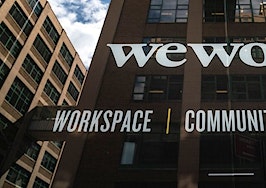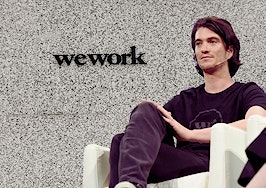On its website, Juno says it wants to reimagine “the cities of tomorrow.”
The company, which just moved out of stealth mode last week, is in the development business and will specifically focus on building multifamily housing. But Juno isn’t just a run-of-the-mill builder.
Instead, it aims to create “a new type of apartment building for the future of the American city.” It plans to build “sustainably, inside and out.” It hopes to put “resident wellbeing front and center.”
And perhaps most significantly of all, the company is run by leaders from famous technology companies and marries the parlance of Silicon Valley to real estate development when it says it’s “building an end-to-end platform to connect and streamline the entire real estate development process.”
Juno is not the first company to attempt a shake up of the the multifamily housing industry. But it’s emergence highlights the way that Silicon Valley is increasingly moving not only into real estate generally, but into the thus-far traditional practice of moving dirt. In other words, after years of emerging real estate portals, customer relationship managers and agent-oriented technology platforms — all of which tend of focus on software — technologists increasingly want to build in the physical world as well.
In Juno’s case, the company officially formed last spring after founders decided they wanted to build better, healthier and more innovative urban housing. Co-founder and CEO Jonathan Scherr told Inman that the idea behind the company is to build medium-sized apartment buildings — so, midrises with between 100 and 200 units — which are a fast-growing type of housing in the U.S. One of the problem with those kinds of project so far, he continued, is that the marketplace has produced generic and mediocre developments that look the same no matter where they’re located.

Jonathan Scherr
“It makes it difficult to innovate in that product type,” Scherr said, adding that his company wants to address that issue with new building materials, and by taking a design-centered approach to housing.
The company has assembled an all-star executive team to make that happen. In addition to Scherr — who has a background in venture capital and finance — Juno’s co-founders also include Marshall Everett, who has worked in real estate development; B.J. Siegel, who while at Apple designed that company’s famous, glassy stores; and Chester Chipperfield, a former executive from Tesla.
The roster is a kind of metonym for the idea that Juno represents: The convergence of technology, design, finance and real estate.
Everett told Inman the company hopes to begin physically building structures by the end of the year. And as it gets closer to that goal, it also envisions some of its innovations kicking in. Among other things, Juno plans to erect buildings using mass timber — a cutting-edge technique that allows taller wood structures. It’s trying to rethink the way building systems work to make them easier for inspectors to access. And it’s exploring ways to enhance things like natural light, green space and energy efficiency.

Marshall Everett
Juno is ultimately willing to rethink everything from the appliances to the type of exterior cladding to the drywall.
The company also plans to take a page from furniture giant Ikea, by manufacturing parts of buildings off-site and then having them assembled in place by local crews that Juno partners with.
“Our go-to market strategy has been focused on finding the right co-development partners,” Everett added.
Juno, of course, is not the first company that wants to shake up the process of building housing. Probably the highest-profile example of the genre in recent years is Katerra, a construction startup that is famous for its backing from Japanese mega-fund Softbank. And while it’s still early days for such firms, the potential for disruption is there.
“Anything that can streamline or cut down the cost of both labor and materials is certainly welcome,” Patrick Carlisle, Compass’ Bay Area-based chief market analyst, told Inman.

Patrick Carlisle
Carlisle explained that housing costs in expensive areas like his have soared thanks to a variety of reasons that include labor, materials, politics, regulatory issues and simply land itself. Relying on new building methods might not do much to solve land scarcity or regulatory red tape, but Carlisle was optimistic about innovations in manufacturing.
“I don’t see any reason why the prefabricated idea shouldn’t work,” he said. “It’s not going to be enough, I don’t think, to radically shift the equation in the Bay Area. But it probably would do more in areas where the land and the political and permitting costs are much less expensive.”
One thing that these startups have going for them, of course, is funding. Much has been made of Katerra’s Softbank backing, and while Softbank itself has had a rough few months, the fund is still a powerful force in the world of venture capital.
Juno isn’t backed by Softbank the way Katerra is, but it has so far raised $11 million in seed capital from a variety of investors, Scherr told Inman. That money was just for funding the early research and development stages of the company, and Juno is now going to raise money to begin working on the real estate side as well.
There are other companies with Silicon Valley pedigrees that have raised piles of cash to disrupt dense urban housing as well. One of the most prominent among them is Starcity, a fast-growing co-living startup that currently manages close to 700 bedrooms. It plans to have 1,000 by the end of the year.
Jon Dishotsky, Starcity’s CEO, told Inman Starcity has so far raised about $50 million.
Starcity’s business model is quite different from Juno’s: The former company rents out bedrooms in buildings with communal kitchens and other common areas, while the latter plans to build something closer to traditional apartments.
But in many ways, the companies emerged from a similar primordial Silicon Valley soup. Dishotsky told Inman, for example, that his company set out to create better and more accessible accommodations in expensive places, and that Starcity wants to streamline the construction processes in order to drive down costs.
Getting funding for Starcity wasn’t initially easy. Dishotsky said that he first went to “40 lenders and real estate investors and they all laughed me out of the office.” He eventually landed in the prestigious Y Combinator startup accelerator program, but it remained an uphill battle to raise funds.

Jon Dishotsky
“It took us a long time to actually raise our seed round,” he explained. “We talked to 180 different investors. It’s always been pretty tricky for us to raise capital.”
However, venture capitalists’ reluctance to invest in companies with numerous hard assets appears to be changing. Dishotsky said that’s because people are beginning to realize such companies can’t be “featured out of business” the way an app might be.
“Venture capitalists started to look at additional verticals,” he explained. “Transportation, logistics, construction. All these other verticals where they knew there weren’t major competitors that could put them out of business overnight.”
Dishotsky also said that increasing affordability problems in the housing market are driving greater interest in solving the issue.
“It comes down to the will of individuals and how bad the problem has gotten,” he said.
For now, it remains to be seen where all of this leads for these still-young companies. Juno is just getting started up now. Co-living is growing generally, but Starcity is less than half a decade old. Katerra — which told Inman it has 15 completed projects and another 86 in the pipeline — was only founded in 2015.
An even larger question is what the convergence of Silicon Valley and real estate will mean over time for the housing market. To some extent, most of the companies in this category all want to make better housing that is available to more people. And that means adding more units. A lot more.
Dishotsky admitted that so far the work his own company has done on that front is a “drop in the bucket,” and he said that today’s urban housing woes will need a combination of solutions. But he also thinks a better future is possible.
“What this pandemic has taught us is living in a shoebox in the sky by yourself is soul-crushing, it’s depressing,” he said. “All we want is to go to bars together and grab a glass of wine. What does that tell you? That there’s something missing in the way that we’re building housing.”













